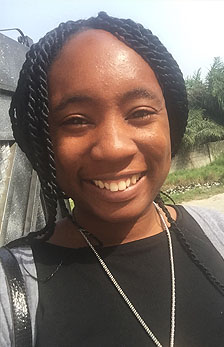Rehabilitation and Participation Science
Program in Occupational Therapy
 Before starting her occupational therapy graduate studies at Washington University, Odochi “Odo” Nwabara, OTD ’15, knew she wanted to pursue an apprenticeship outside of the U.S.
Before starting her occupational therapy graduate studies at Washington University, Odochi “Odo” Nwabara, OTD ’15, knew she wanted to pursue an apprenticeship outside of the U.S.
“I was born in Chicago, but my parents are originally from Nigeria. My father came to the U.S. when he was a teenager. We have family in Lagos, Nigeria, so I reached out to my aunt to help me find a place there that works with children with disabilities,” explains Nwabara. “She found The Learning Place Centre (TLPC), which treats children and young adults with Autism Spectrum Disorders (ASD) and provides education for their families and caregivers.”
As there are very few treatment centers in Nigeria, the majority of individuals with autism are not diagnosed and do not receive any form of intervention. The staff at TLPC treats approximately 30 clients each term. Treatment plans are customized to help clients overcome their unique daily challenges and to empower them to live independently in their community. Nwabara worked alongside occupational therapist Yusuf Aliu, who was her direct supervisor during her five-week apprenticeship.
“Mr. Aliu and I held sessions with our clients every hour. Some of the treatments we did included fine motor, recreational and handwriting activities; cognitive-based games; range of motion of the lower and upper extremities; and trunk, upper and lower extremity strengthening activities,” recalls Nwabara. “Mr. Aliu impacted my growth as a therapist. I would ask him questions, and he would give me feedback on our clients’ progress. He was also open to hearing and implementing my ideas.”
Bolanle Adewole, founder and executive director of TLPC, saw the positive impact that Nwabara had on the center’s clients. “Odo instantly connected with our clients and was well liked. Within a day of meeting her, my son (who is also a client) came home and said, 'I met Miss Odo. I like Miss Odo.' I believe she made a good impression,” she says.
Each week, Nwabara interacted with all TLPC clients through individual or group sessions. One client in particular made an impression on Nwabara. “I worked with a ten-year-old girl who had cerebral palsy and used forearm crutches for ambualtion. She was very special to me because I saw her more often than the other clients. I worked with her primarily to improve her standing independently and her standing endurance. Mr. Aliu and I were then able to transition her to walking inside and outside using visual and auditory cues. In time, she required less assistance ambulating around the restroom and completing the necessary steps to use the toilet. Her progress was great to witness,” she says.
Aliu saw clients improve under Nwabara’s care. "Odo contributed to the progress of the clients and also cared about other therapists in the building. She participated in group sessions and assisted clients with self-help skills (proper self-feeding skills, toileting, hand washing after meals, etc.),” he says.
Nwabara took a personal approach to working with clients at the center. She spent time building rapport and trust with a client who demonstrated aggressive behaviors. Eventually, she and Aliu were able to make progress with his care. While at the center, Nwabara also helped a few of the center’s adult clients lead an aerobics class. “That was a lot of fun,” she says.
Nwabara valued the center’s comprehensive and collaborative approach to treatment. “Every Wednesday, we had a staff meeting to discuss the clients’ progress and brainstorm ideas. Mr. Aliu and I completed documentation for our clients in between sessions and at the end of the day. Parents are given daily and weekly project reports from the therapists. I was impressed by the center’s level of professionalism with the clients, their families and with me. I am also in awe with everything that Mrs. Adewole has done so far with TLPC. She is doing amazing things for this population in Nigeria.”
At the end of the five weeks, the staff at TLPC wanted to thank the faculty and staff of the Program in Occupational Therapy for arranging Nwabara’s international apprenticeship. As an enrichment activity, the older clients at TLPC make journals, bowls and other items out of Ankara-African printed fabric. The staff sent Nwabara home with several of these handmade gifts to honor her mentors at WashU. Although her time at TLPC was short, Nwabara will be missed at the center.
“We enjoyed Odo’s professionalism, care and pleasant disposition. She freely shared her knowledge and contributed great ideas to add to what we already do. We would gladly host her again,” shares Adewole.
We welcome inquiries from prospective students, potential collaborators, community partners, alumni and others who want to connect with us. Please complete the form below to begin the conversation.
Schedule an Info Session
We are excited that you are considering applying to the Program in Occupational Therapy at Washington University. Please join us for a Zoom Information Session for either our entry-level MSOT or OTD degrees or our online Post-Professional OTD. Current faculty members will discuss the degree program and answer any question you may have. We are offering these sessions on the following days and times. The content is the same for each one, so you only need to sign up for one.
Upcoming ENTRY-LEVEL Degree ZOOM Info sessions:
Schedule an Entry-Level Info Session
Upcoming PP-OTD Degree ZOOM Info session: